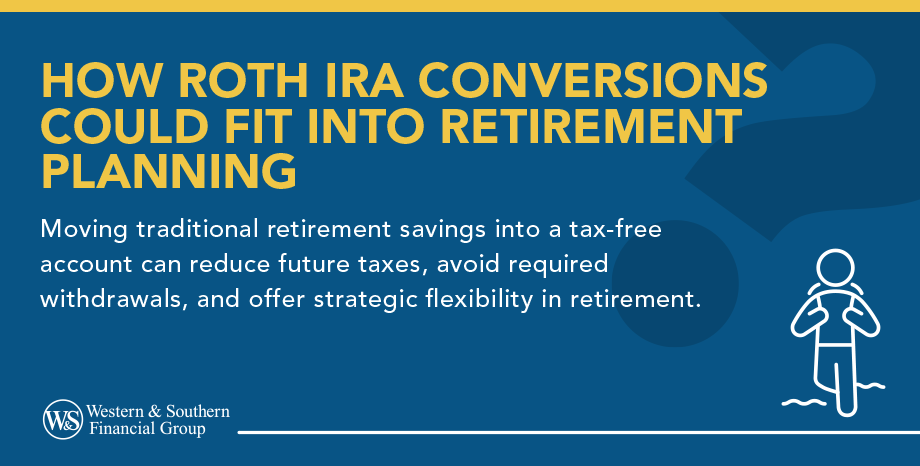

Key Takeaways
- Roth IRA conversions let you trade future tax bills for tax-free growth by paying taxes now.
- There are no limits on how much you can convert, but large conversions can trigger hefty tax bills.
- Each conversion starts its own five-year clock before the funds can be withdrawn penalty-free.
- Strategic conversions during low-income years, early retirement, or market downturns may lower your overall tax burden.
- Working with a financial advisor can help you time conversions, manage tax brackets, and avoid Medicare or RMD surprises.
Understanding the Roth IRA Conversion Landscape
A Roth IRA conversion involves moving money from a traditional IRA, 401(k), or other traditional retirement accounts into a Roth IRA. Traditional accounts provide upfront tax deductions with taxable withdrawals, while Roth IRAs offer tax-free growth and withdrawals.1
The conversion process requires paying income taxes on the converted amount in the year of conversion. However, once converted, the money grows tax-free, and qualified distributions after age 59½ come out without any tax burden.
Key Components of Roth Conversions
- The Tax Trade-Off: You're essentially trading tax-deferred growth for tax-free growth. The critical question becomes: Will your tax rate be higher or lower in retirement compared to today?
- Timing Flexibility: Unlike contributions, which have strict annual limits, conversions have no dollar limits. You can convert $10,000 or $100,000 in a single year, though the tax implications vary dramatically.2
- The Five-Year Rule: Each conversion starts its own five-year clock for penalty-free withdrawals of converted principal.3 This rule applies even if you already have an established Roth IRA.
Strategic Reasons to Consider Roth Conversions
Escaping Future Required Minimum Distributions
Traditional retirement accounts force Required Minimum Distributions starting at age 73.4 These mandated withdrawals can push retirees into higher tax brackets and trigger additional Medicare premiums.5 Medicare premiums may be affected by income levels. Please consult Medicare.gov or your tax advisor for details.
Roth IRAs have no RMDs during the original owner's lifetime. This flexibility allows you to control your taxable income in retirement and potentially leave a larger tax-free legacy to beneficiaries.
Tax Diversification Benefits
Financial professionals increasingly emphasize tax diversification alongside investment diversification. Having money in different "tax buckets" provides flexibility to manage your tax liability as tax laws change.
Three Tax Buckets Strategy:
- Taxable accounts: Regular investment accounts with capital gains treatment
- Tax-deferred accounts: Traditional IRAs, 401(k)s with future tax liability
- Tax-free accounts: Roth IRAs and Roth 401(k)s with no future taxes
Market Timing Opportunities
Stock market downturns create compelling conversion opportunities. Converting during market lows means paying taxes on depressed asset values while capturing the full recovery in the tax-free Roth environment.
For example, converting $50,000 during a 20% market decline effectively converts $62,500 worth of normal-market assets while only paying taxes on $50,000.
Case Study Examples
Example 1: Early Retiree
Sarah, 58, retired early with $800,000 in traditional IRA assets. She plans to live on savings until age 62, then begin Social Security.6 Converting $40,000 annually during her low-income years fills the 12% tax bracket while avoiding higher rates when Social Security begins.
Example 2: High-Income Professional
Dr. Martinez, 45, earns $300,000 annually but expects lower retirement income. Rather than immediate conversions, he focuses on maximizing traditional contributions now and plans strategic conversions after retirement when his tax bracket drops.
Hypothetical examples for illustrative purposes only. Not indicative of any specific client situation.
Optimal Timing Strategies for Roth Conversions
Early Retirement and Gap Years
The period between early retirement and Social Security eligibility often presents ideal conversion opportunities. With reduced income from employment but before pension or Social Security benefits begin, many retirees find themselves in lower tax brackets.
This "gap period" allows for strategic conversions that fill up lower tax brackets without pushing you into higher rates.
Pre-Medicare Considerations
Converting before Medicare eligibility (age 65) avoids the potential for increased Medicare premiums triggered by higher modified adjusted gross income. Medicare's Income-Related Monthly Adjustment Amount (IRMAA) can significantly increase healthcare costs for higher-income retirees.5
Annual Tax Bracket Management
A systematic approach involves converting enough each year to fill up your current tax bracket without spilling into the next higher rate. This strategy, often called "bracket filling," maximizes the tax efficiency of conversions.
These general strategies may not be suitable for everyone. Consult with a tax or financial professional to determine what's right for your individual situation.
Potential Drawbacks & Considerations
Immediate Tax Impact
The most significant hurdle is paying conversion taxes upfront. Converting $100,000 could generate $22,000-$37,000 in federal taxes, depending on your tax bracket, plus state taxes where applicable.
Cash Flow Considerations:
- Ideally, pay conversion taxes from non-retirement sources
- Avoid using IRA funds to pay conversion taxes (creates additional taxable income)
- Consider the impact on your emergency fund and liquidity needs
State Tax Implications
State tax treatment of conversions varies significantly. Some states have no income tax, while others may impose substantial additional tax burdens on conversions.
State-Specific Strategies:
- Consider timing conversions with state residency changes
- Understand your state's treatment of retirement income
- Factor state taxes into conversion calculations
Loss of Tax Deferral
Money converted to Roth IRAs loses the benefit of continued tax deferral. If you're in a high tax bracket now but expect to be in a lower bracket in retirement, conversions might not make financial sense.
Advanced Conversion Strategies
Roth Conversion Ladders
This strategy involves systematic annual conversions over multiple years, spreading the tax impact while gradually building tax-free assets. Conversion ladders work particularly well for early retirees who need penalty-free access to retirement funds before age 59½.
Asset Location Optimization
Consider which assets to convert based on their growth potential. Converting growth-oriented investments maximizes the benefit of tax-free compounding, while keeping income-generating assets in tax-deferred accounts might be more efficient.
Charitable Giving Integration
For philanthropically minded individuals, qualified charitable distributions from traditional IRAs can satisfy RMD requirements while avoiding taxes.4 This strategy can complement Roth conversions by managing taxable income in retirement.
Working with Financial Professionals
When to Seek Professional Guidance
Roth conversion decisions involve complex interactions between tax planning, investment management, and estate planning. A qualified wealth advisor or financial professional can model various scenarios and help optimize timing.
Key Professional Services:
- Tax projection modeling
- Estate planning integration
- Investment management during conversions
- Medicare and Social Security optimization
Questions for Your Advisor
Before implementing conversions, discuss:
- Your expected retirement tax bracket
- State tax implications
- Estate planning goals
- Healthcare cost projections
- Social Security timing strategies
Implementation Best Practices
Documentation and Reporting
Roth conversions must be reported on Form 1040, and you'll receive Form 1099-R showing the distribution from your traditional IRA.3 Proper documentation ensures smooth tax filing and future qualified distribution verification.
Timing Within the Tax Year
Consider spreading large conversions across multiple years or timing them early in the year to allow maximum time for tax planning and payment preparation.
Monitoring and Adjustment
Conversion strategies should be reviewed annually as tax laws, income levels, and market conditions change. What made sense five years ago might not be optimal today.
Conclusion
A Roth IRA conversion can be a powerful tool for long-term tax planning, retirement flexibility, and legacy building, but it’s not a one-size-fits-all strategy. Understanding the timing, tax impact, and integration with your broader financial goals is key. With careful planning and professional guidance, Roth conversions can help shift your retirement savings into a more tax-efficient future.
Support your employees' retirement with an IRA plan offering matching contributions. Start Your Free Plan
Frequently Asked Questions
Can I reverse a Roth conversion if I change my mind?
How do Roth conversions affect my Social Security benefits?
Can I convert just part of my traditional IRA?
How do early withdrawal penalties work with converted funds?
Should I convert my 401(k) or wait until I roll it to an IRA?
Sources
- Roth IRAs - Internal Revenue Service. https://www.irs.gov/retirement-plans/roth-iras.
- Publication 590-A, Contributions to Individual Retirement Arrangements (IRAs) - Internal Revenue Service. https://www.irs.gov/pub/irs-pdf/p590a.pdf.
- Publication 590-B, Distributions from Individual Retirement Arrangements (IRAs) - Internal Revenue Service. https://www.irs.gov/pub/irs-pdf/p590b.pdf.
- Required Minimum Distributions for Retirement Plans - Internal Revenue Service. https://www.irs.gov/retirement-plans/retirement-plan-and-ira-required-minimum-distributions-faqs.
- Part B (Medical Insurance) costs. https://www.medicare.gov/basics/costs/medicare-costs.
- Social Security Benefits Taxation - Social Security Administration. https://www.ssa.gov/benefits/retirement/planner/taxes.html.
Footnotes
- Qualified Roth IRA withdrawals are generally tax-free provided the account has been open for at least five years and the account holder is over age 59½. Withdrawals may be subject to income tax and penalties if these conditions are not met.





















